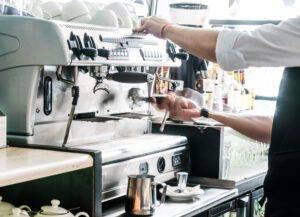Coffee is more than just a beverage; it is a global cultural phenomenon and a billion-dollar industry. With millions of people around the world relying on their daily cup of joy, the coffee business has always been ripe for innovation.
As technology evolves, coffee businesses are integrating advanced tools and methods to enhance every aspect of production, distribution, and customer experience. This article explores the latest technological advancements reshaping the coffee industry, from farm to cup.
From Farm to Cup: Revolutionizing Coffee Production
Farmers are now leveraging precision agriculture techniques and drone technology to optimize coffee cultivation. Precision agriculture uses data analytics to monitor and manage crops, ensuring optimal growth conditions. Drones equipped with multispectral imaging can survey coffee plantations, providing real-time data on soil health, plant stress, and pest infestations. This allows farmers to make informed decisions on irrigation, fertilization, and pest control, ultimately improving crop yields and quality.
Blockchain technology is also bringing unprecedented transparency to the coffee supply chain. By creating an immutable ledger of transactions, blockchain allows every stakeholder in the supply chain—from farmers to consumers—to verify the origin and journey of coffee beans. This ensures that coffee is ethically sourced and traded, promoting fair trade practices and enabling consumers to make informed purchasing decisions. Companies like IBM and Provenance are already implementing blockchain solutions in coffee supply chains, helping to eliminate fraud and ensure the integrity of premium coffee products.
Transforming Coffee Retail: Smart Cafés and Automation
Robotic Baristas
The rise of robotic baristas is transforming the coffee retail landscape. These robots, equipped with precision brewing capabilities, can prepare a variety of coffee beverages with consistent quality and efficiency. For instance, Café X, a pioneering company in this space, uses robotic arms to brew and serve coffee, reducing wait times and labour costs. This automation not only enhances operational efficiency but also allows human baristas to focus on more complex tasks, such as customer service and artisanal brewing techniques.
Mobile Ordering and Contactless Payments
The COVID-19 pandemic accelerated the adoption of mobile ordering and contactless payment solutions in coffee shops. Apps like Starbucks and Dunkin’ Donuts allow customers to place orders and pay for their coffee using their smartphones, minimizing physical contact and streamlining the purchasing process. These apps also offer loyalty programs and personalized recommendations based on customers’ purchase history, enhancing customer engagement and retention.
AI-Powered Customer Insights
Artificial intelligence (AI) is used to analyse customer data and provide actionable insights for coffee businesses. AI algorithms can process large volumes of data from social media, online reviews, and sales transactions to identify trends and preferences. This enables coffee shops to tailor their offerings to meet customer demands, optimize inventory management, and develop targeted marketing campaigns. For example, AI can predict which seasonal flavours will be popular, allowing businesses to prepare in advance and reduce waste.
Enhancing the Brewing Experience
Smart Coffee Machines
The advent of smart coffee machines has brought the convenience of café-quality coffee into homes. These IoT-enabled devices can be controlled remotely via smartphones, allowing users to schedule brewing times, customize brewing parameters, and receive maintenance alerts. Brands like Nespresso and Keurig offer smart models that integrate with virtual assistants like Amazon Alexa and Google Home, enabling voice-activated commands. These machines also collect data on brewing habits, helping manufacturers improve product design and functionality.
Subscription Services
Subscription services for coffee are gaining popularity, providing consumers with a steady supply of high-quality beans delivered to their doorstep. Companies like Blue Bottle Coffee and Trade Coffee offer personalized subscriptions based on users’ taste preferences and brewing methods. These services often include access to exclusive roasts and detailed information about the origin and profile of the beans, enriching the home brewing experience.
Sustainable Practices and Innovations
Eco-Friendly Packaging
Sustainability is a growing concern in the coffee industry, leading to innovations in eco-friendly packaging. Biodegradable and compostable materials are being used to replace traditional plastic packaging, reducing the environmental impact.
Energy-Efficient Equipment
Energy efficiency is another area where technological advancements are making a significant impact. Modern commercial coffee machines and roasting equipment are designed to minimize energy consumption and reduce carbon footprints. Similarly, energy-efficient espresso machines with programmable settings help coffee shops save on energy costs while maintaining optimal brewing performance.
The Future of Coffee Businesses: A Blend of Tradition and Technology
As the coffee industry continues to evolve, the integration of technology is poised to enhance every facet of the business. From precision farming techniques that improve crop yields to AI-powered insights that drive customer engagement, technological advancements are creating a more efficient, sustainable, and customer-centric coffee experience. However, the essence of coffee—its rich flavours, cultural significance, and the human connections it fosters—remains unchanged. By embracing technology while honouring tradition, coffee businesses can continue to thrive in an increasingly digital world.
In conclusion, the technological revolution in the coffee industry is just beginning. As innovations continue to emerge, they promise to elevate the coffee experience for farmers, retailers, and consumers alike. Whether it’s enjoying a perfectly brewed cup from a smart coffee machine at home or savouring an ethically sourced espresso at a café, the future of coffee is brimming with exciting possibilities.
